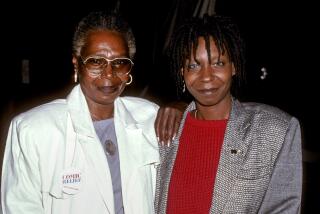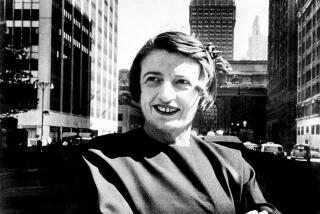Murder in the Garden : HOT MONEY <i> by Dick Francis (G. P. Putnam’s Sons: $17.95, 324 pp.)</i>
A father and son who have not spoken to one another for three years are the initially unlikely allies and co-principals of “Hot Money,” the latest well made and highly entertaining novel from British mystery writer Dick Francis.
Malcolm Pembroke is the father, a bluff but magnetic 68-year-old who’s acquired considerable wealth as an arbitrageur (“A guy who makes money buying low and selling high,” his son explains). Gold, metals, shares--Malcolm trades them all with a dazzling skill that earns him the nickname of Midas. His personal life, though, has been something of a disaster. Malcolm has loved neither wisely nor well, spawning an extended family of five wives and 10 children, most of whom have grown to more or less despise each other.
Ian Pembroke, the 33-year-old narrator, took particular exception to Malcolm’s fifth fiancee, describing her to the old man as “a bloodsucking tramp” and getting physically knocked down for his candor. Hence the three-year rift. But suddenly Malcolm rings up and enters Ian’s life as abruptly as he’d left it. Fifth wife Moira has been murdered--her “retrousse little nose” held in a bag of potting compost as she tended the geraniums. No one especially misses Moira, a nasty schemer who smiled sweetly as she turned the vindictive screws. (“That was her sort of way,” the gardener says with a shrug. “Mean, but within her right.”) It’s only that the police aren’t completely certain that the about-to-be-divorced Malcolm didn’t arrange for Moira’s death. More urgently, someone--a family member, it would seem, motivated by greed--is bent on dispatching Malcolm himself; and the patriarch turns for help to Ian, still the only child he thinks he can trust.
Working as an assistant to a racehorse trainer, Ian has avoided personal entanglements. He’s seen one stepbrother react to their father’s inconstancy by chaining himself to a miserable marriage. “It was from fear of making the same calamitous mistake,” Ian admits, “that I had married no one at all.” His one passion is riding in horse races as an amateur jockey: “an act of health on a sick planet.” Now his alliance with Malcolm thrusts Ian into life-or-death situations, and he finds he responds to peril with the accelerated heartbeat of a rider at the start of a race.
Malcolm, for his part, seems to relish life all the more for having nearly been robbed of it. He gleefully--perversely, even--sets about spending his huge fortune before whoever’s trying to do him in can get at it. “I can’t help making money,” father tells son. “I’ve spent all these years amassing the stuff, and for what? For my . . . children to murder me for? Sod that . . . .” He buys his way overnight into the world of high-priced horseflesh, and Malcolm and Ian are launched on a dizzying spree that takes them from Paris to Los Angeles to Melbourne, first class all the way.
Between jaunts with his dad, Ian sleuths his way through a viper’s nest of relatives, hoping to flush Moira’s killer before Malcolm (or he himself) is bitten next. The police are kept somewhat informed of his movements, but plausible reasons are found to keep them at bay. A professional private detective--a “damp-handed nervous threadbare individual”--is employed for some initial spadework, but Ian is determined to solve this mystery on his own. He has the edge over any outsider, he thinks. He alone can “search through character and history, not alibis. . . . Only someone in the family itself could go that route. . . .”
Solve it all he does, to be sure--along the way making peace with his father and (not incidentally) with himself. In the course of things, there are some explosive turns of plot, a fair amoint of wry humor and a good half-dozen horse races to satisfy the author’s loyal audience. (Narrator Ian is particularly impressed by our own Santa Anita, seen during the Breeders Cup meet: “Towered and turreted, sea-green in color. . . . It looked more like a chateau than a racecourse. . . .”) And, as might be expected, we learn a certain amount of racing lingo. “On the nod,” for instance, refers to a horse winning by the forward motion of its head across the finish line. And the “hot money” of the book’s title, it’s explained, means “the bets made by people in the know.”
The hot money this time out, as always, is with Dick Francis.
More to Read
Sign up for our Book Club newsletter
Get the latest news, events and more from the Los Angeles Times Book Club, and help us get L.A. reading and talking.
You may occasionally receive promotional content from the Los Angeles Times.






